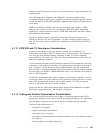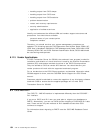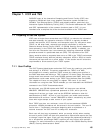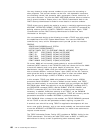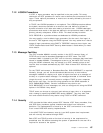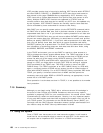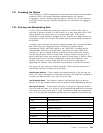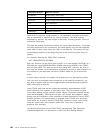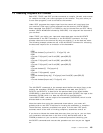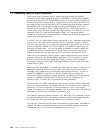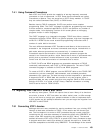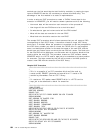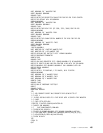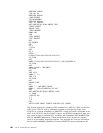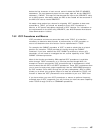
7.3 Executing Programs at a Terminal
Both ICCF, TSO/E, and ISPF provide commands to compile, link-edit, and execute
(or compile and load) your source program at the terminal. They also allow you
to use other programs, such as utilities at the terminal.
Under ICCF programs that expect input from the console will read input from
your terminal. Card input is either entered from the terminal (/DATA INCON)
when requested from SYSIPT or SYS005 or can be included from an ICCF library
member (/DATA NOINCON followed by /INCLUDE). List output will be returned to
your terminal.
Under TSO/E, you define your input and output data sets via the ALLOCATE
subcommand of the EDIT command, or the ALLOCATE command. You may
allocate a data set to the terminal by using an asterisk (*) as the data set name.
The following example shows the use of the ALLOCATE command for allocating
the data sets required for an execution of the Assembler.
.
.
READY
allocate dataset(′ sys1.maclib′) file(syslib) shr
READY
allocate file(sysut1) new block(400) space(400,50)
READY
allocate file(sysut2) new block(400) space(400,50)
READY
allocate file(sysut3) new block(400) space(400,50)
READY
allocate dataset(*) file(sysprint)
READY
allocate file(syspunch) sysout
READY
allocate dataset(prog.obj) file(sysgo) new block(80) space(200,50)
READY
allocate dataset(input.asm) file(sysin) old
.
.
The ALLOCATE commands in the example would define the macro library to be
used by the assembler (SYSLIB), the assembler work data sets (SYSUT1,
SYSUT2, and SYSUT3), a data set for the punched deck of an object module
(SYSPUNCH), a data set for the link and go object deck (SYSGO), the input to the
assembler (SYSIN) which is a data set with the fully qualified name
′userid.INPUT.ASM′, and the output of the assembler (SYSPRINT) which is to be
directed back to the terminal.
Note that rather than using the commands shown above, your users will
probably wish to use ISPF′s facilities for invoking the assembler or compilers.
These facilities, commonly available from option 4 of the main ISPF panel,
automate much of the work of invoking compilers, assemblers and so on.
If you have to allocate the same data sets every time you log on, you can have
your installation allocate them in the form of fully defined data sets in the
LOGON procedure or you can build a command procedure containing your
ALLOCATE commands and execute that procedure as soon as you are logged
on.
Chapter 7. ICCF and TSO 161



